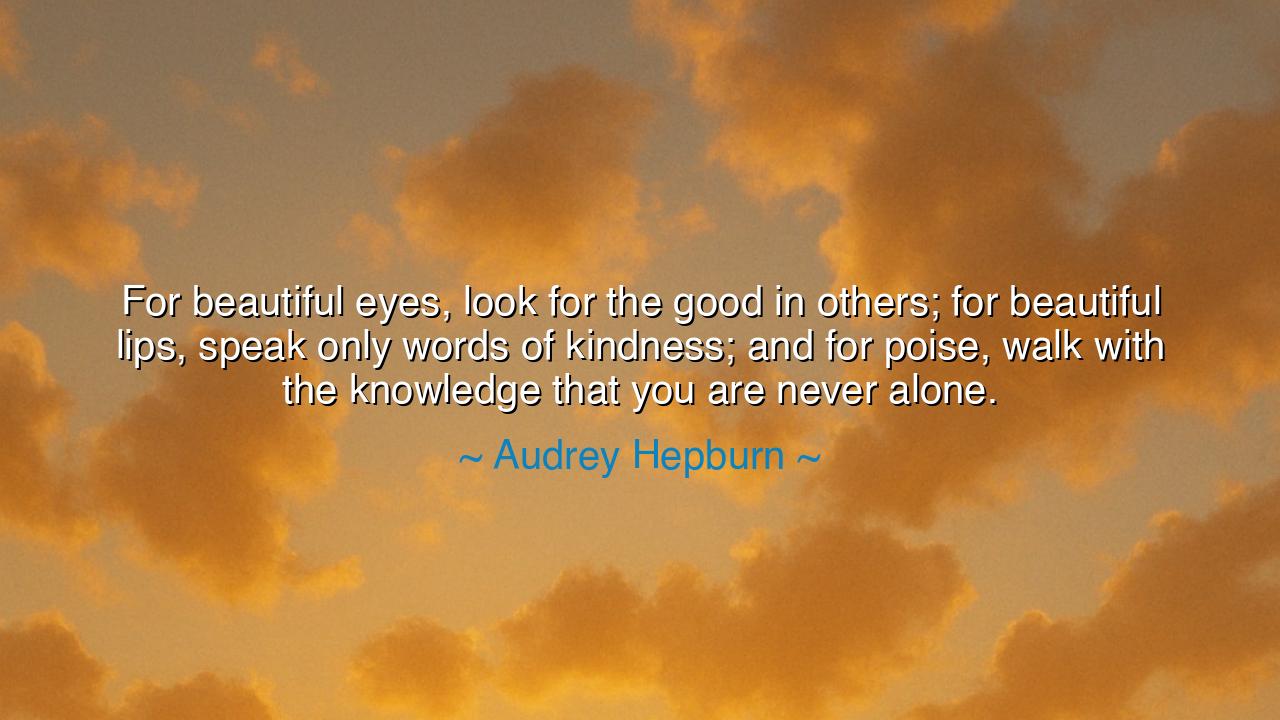
For beautiful eyes, look for the good in others; for beautiful
For beautiful eyes, look for the good in others; for beautiful lips, speak only words of kindness; and for poise, walk with the knowledge that you are never alone.






Audrey Hepburn imparts a timeless truth in her words: "For beautiful eyes, look for the good in others; for beautiful lips, speak only words of kindness; and for poise, walk with the knowledge that you are never alone." In this reflection, she teaches that true beauty emanates not from outward appearances, but from the qualities we cultivate within. To see goodness in others, to speak with kindness, and to carry ourselves with grace—these are the keys to a beauty that transcends the physical and touches the soul. Beauty, in Hepburn's view, is an outward manifestation of the virtues we nurture in our hearts and minds, and it is through these inner qualities that we shine most brightly.
The ancients understood that beauty was not a mere matter of external features, but of virtue and wisdom. Socrates, in his philosophy, often pointed to the importance of moral beauty over physical appearance. He believed that true beauty was rooted in the cultivation of inner virtues such as wisdom, courage, and justice. For Plato, the highest form of beauty was the beauty of the soul, which radiates outward through good actions and thoughtful intentions. The outward beauty that comes from the body is fleeting, but the beauty that arises from living a virtuous life is eternal. Hepburn's quote mirrors this ancient understanding: the true beauty of a person is reflected not in their eyes, lips, or posture, but in their capacity to see the goodness in others, to speak with compassion, and to carry themselves with the dignity that comes from being at peace with their inner self.
Consider the life of Mahatma Gandhi, whose inner poise and compassion made him one of the most revered figures in history. Gandhi’s beauty was not in his appearance, but in his unwavering commitment to truth and non-violence. His ability to see the good in others, even in the most challenging circumstances, was a testament to his inner vision. He spoke with kindness, never resorting to violence or hatred, and he carried himself with a grace that came from his deep faith and conviction. Like Hepburn’s ideal, Gandhi’s inner beauty shone through in his actions, and his life became a beacon for millions seeking to live with dignity and compassion.
Similarly, Mother Teresa, with her humble service to the poor and sick, embodies the beauty of kindness and compassion. Her eyes, though not striking in the conventional sense, radiated a profound sense of love and hope. Her words were always kind, offering comfort to those in need. Mother Teresa’s life demonstrates that the true beauty of lips lies not in their appearance but in the words they speak—the words that offer solace, encouragement, and support. Her poise came not from external finery, but from the knowledge that she was part of something greater—that her actions, no matter how small, were aligned with a higher purpose.
Hepburn’s words also remind us that true beauty is rooted in the knowledge that we are never truly alone. The sense of aloneness that many of us feel is often a result of the distractions and isolation of modern life. Yet, the ancients believed that to be at peace with oneself was to know that we are part of a greater whole, that we are connected not only to one another, but to the divine and the universe itself. Marcus Aurelius, the Roman Emperor and Stoic philosopher, taught that we should walk through life with the understanding that we are connected to all things. When we walk with this knowledge, we move with confidence, poise, and an unshakeable sense of belonging. Hepburn's reminder that we are never alone invites us to live with that same awareness, to carry ourselves with grace, knowing that we are part of a much larger story.
The lesson from Hepburn’s words is clear: true beauty is not found in external appearances but in the virtues we cultivate within. To see the goodness in others, to speak with kindness, and to walk through life with poise—these are the qualities that define us and that leave a lasting impact on the world. Beauty is not about what we look like, but about how we live. It is through our actions, our words, and the way we carry ourselves that we reveal our inner essence.
Therefore, I encourage you, dear reader, to reflect on the beauty you wish to cultivate in your own life. Strive to see the good in those around you, to speak with words that uplift and inspire, and to move through the world with the poise that comes from knowing your true worth. When we live in alignment with these principles, we find that our inner beauty shines brightly, and that the world, in turn, is illuminated by the light of our compassion, kindness, and grace. Let us walk with the understanding that we are never alone, and in doing so, we find our place in the world and our true beauty.






AAdministratorAdministrator
Welcome, honored guests. Please leave a comment, we will respond soon